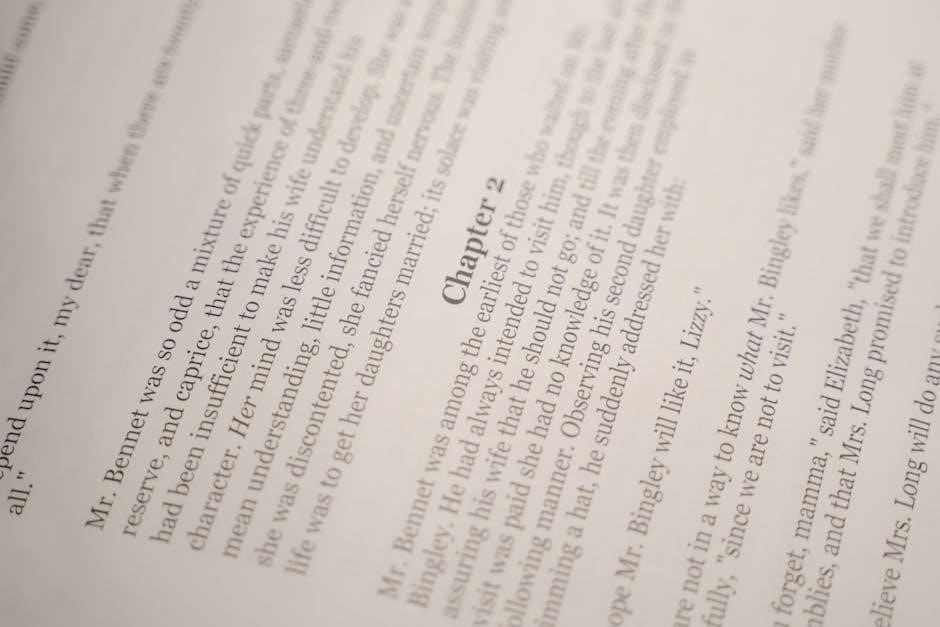Jonas, an eleven-year-old protagonist, lives in a seemingly utopian society. He is thoughtful, observant, and initially happy, but feels apprehensive about his upcoming Ceremony of Twelve, revealing his growing curiosity and unease about his role in the community.
1.1 Jonas’s Emotional State at the Beginning of Chapter 1
Jonas begins Chapter 1 in a state of growing unease and self-reflection. He struggles to define his emotions, correcting himself when he initially describes his feelings as “frightened.” This internal dialogue reveals his thoughtful nature and deepening anxiety. Jonas feels apprehensive about the upcoming Ceremony of Twelve, which looms over him as December approaches. His emotional state shifts from initial happiness to a sense of fear and uncertainty, hinting at the complexity of his inner world and the weight of the unknown ahead.

The Setting of the Story
The story unfolds in a futuristic, dystopian society with a seemingly utopian facade. It is nearly December, and the Ceremony of Twelve looms, creating an atmosphere of anticipation and subtle unease. The setting is tightly controlled, emphasizing order and conformity, yet hinting at underlying secrets and darkness beneath the surface of this “perfect” community.
2.1 The Community and Its Utopian Facade
The community in The Giver presents itself as a utopian society, emphasizing order, equality, and the absence of pain or suffering. On the surface, it appears harmonious, with everyone following strict rules and protocols. However, this facade hides a deeply controlled environment where emotions, memories, and individuality are suppressed. The society’s rigid structure, including ceremonies like the Ceremony of Twelve, enforces conformity. This uniformity creates a sense of peace but also hints at a darker reality beneath the surface, as Jonas begins to sense the community’s unsettling truths.
2.2 The Time Period: “It Was Almost December”
The story begins with the phrase “It was almost December,” setting the stage for Jonas’s journey. This time period is significant as it marks the approach of the Ceremony of Twelve, a pivotal event in the community. The nearing of December creates a sense of anticipation and unease for Jonas, who is grappling with his emotions and the unknown future. The season also symbolizes transition, reflecting Jonas’s internal shift from innocence to awareness, as he begins to question the perfection of his society.
Jonas’s Family and Home Life
Jonas lives with his parents and younger sister Lily in a cozy home. His father, a Nurturer, brings home Gabriel, a troubled newborn, showing Jonas’s family’s caring nature.
Jonas’s parents are loving and supportive, with his father working as a Nurturer, caring for newborns. His mother is in the Department of Justice, contributing to societal order. Jonas’s younger sister, Lily, is seven years old and lively, awaiting her Ceremony of Eight, where she will receive her front-button jacket. The family shares quiet evenings together, discussing their feelings and experiences, showcasing a close-knit bond despite the community’s emotional constraints.

The Ceremony of Twelve
The Ceremony of Twelve is a pivotal event marking the transition to adulthood. Jonas, nearing this milestone, feels apprehensive, unsure of his future role in society.
4.1 Jonas’s Apprehensions About the Upcoming Ceremony
Jonas feels increasingly anxious as the Ceremony of Twelve approaches. He struggles to define his emotions, fearing the unknown responsibilities and changes it will bring. The memory of an unidentified aircraft incident a year prior resurfaces, heightening his unease. Jonas’s apprehensions reflect a growing awareness of the ceremony’s significance and the mysteries surrounding his future role in the community. His nervousness underscores the weight of this pivotal moment in his life.
4.2 The Significance of the Ceremony in the Community
The Ceremony of Twelve is a pivotal event in the community, marking the transition from childhood to adulthood. It is a structured and highly anticipated ritual where individuals are assigned their life roles, ensuring the community’s continued harmony and control. The ceremony reinforces the society’s values of conformity and collective goals over personal desires. It symbolizes the suppression of individuality, as each person’s role is predetermined, highlighting the community’s emphasis on order and the eradication of emotional depth.
The Society’s Rules and Norms
The society enforces strict rules to maintain conformity and control. Emotions and individuality are suppressed, and every aspect of life is governed by precise, unyielding norms to ensure harmony.
5.1 The Concept of “Releasing” and Its Implications
The concept of “Releasing” in Jonas’s society is shrouded in ambiguity, often associated with the removal of individuals who fail to conform or meet expectations. While presented as a humane act, it implies a darker reality, hinting at the elimination of those deemed unfit. This practice underscores the society’s emphasis on sameness and control, revealing the unsettling truth beneath its utopian surface. The fear of “Releasing” instills compliance and reinforces the community’s rigid norms, masking the true nature of this supposed mercy.
5.2 The Lack of Emotions in the Community
In Jonas’s society, emotions are suppressed to maintain a facade of utopia. The community’s rigid rules and emphasis on conformity ensure that feelings like love, anger, or fear are erased. This emotional numbness is seen as necessary for societal harmony, but it also strips individuals of their humanity. The lack of emotions creates a sterile environment where people like Jonas struggle to understand their true feelings, highlighting the trade-off between order and individuality in this seemingly perfect world.

The Incident with the Unidentified Aircraft
Jonas recalls an unidentified aircraft flying over the community, causing fear. The incident highlights his deep-seated anxiety and the community’s controlled, measured response to such rare disturbances.
6.1 Jonas’s Fear and the Community’s Reaction
Jonas experiences deep fear when an unidentified aircraft flies over the community, evoking a “sickening feeling” of dread. This incident, a year prior, left a lasting impression on him, highlighting his sensitivity to unusual events.
The community reacts with controlled, measured responses, reflecting their structured society. Jonas’s fear contrasts with the community’s calm, showcasing their suppression of strong emotions and adherence to order, further revealing the society’s rigid control over its members’ experiences and reactions.
The Character of Gabriel
Gabriel, a troubled newchild, is introduced as a vulnerable infant struggling to thrive. His presence highlights the community’s rigid rules and the tension surrounding individuality.
Gabriel, a fragile and struggling newchild, is introduced as a baby in need of extra care. His name is revealed by Jonas’s father, who hopes to help him thrive. Gabriel’s presence highlights the community’s rigid rules about individuality and survival. Despite his difficulties, Gabriel’s unique qualities begin to emerge, showing glimpses of a personality that sets him apart from others. This sparks Jonas’s interest and subtle concern, hinting at a deeper connection to come.
Themes and Motifs in Chapter 1
The chapter introduces themes of control, conformity, and suppressed emotions, hinting at the society’s rigid structure. The motif of a utopian facade masking underlying darkness emerges strongly.
8.1 The Importance of Language and Word Choice
Language plays a crucial role in shaping the narrative and themes of Chapter 1. Jonas’s careful selection of words, such as replacing “frightened” with a more precise term, reflects the society’s emphasis on exactness and control. The community’s rigid vocabulary highlights its pursuit of uniformity, while Jonas’s internal dialogue reveals his growing awareness of emotions and complexities beyond the prescribed language. This focus on word choice underscores the tension between conformity and individual understanding, foreshadowing the deeper truths Jonas will uncover.
The Narrative Style
The narrative employs a third-person limited perspective centered on Jonas, offering intimate insight into his thoughts and emotions while gradually unveiling the community’s controlled environment.
9.1 The Third-Person Perspective Focused on Jonas
The narrative is delivered in a third-person limited perspective, closely following Jonas’s thoughts and feelings. This style allows readers to deeply connect with Jonas while maintaining suspense about the broader community. The focus on Jonas’s internal struggles, such as his fear and curiosity, creates a personal and emotional connection. The perspective also subtly hints at the community’s secrets, as the narrative does not venture beyond Jonas’s understanding, mirroring his limited knowledge of the society’s true nature.
Symbolism in Chapter 1
Symbolism in Chapter 1 includes Jonas’s apprehensions and the Ceremony of Twelve, reflecting the community’s utopian facade and Jonas’s growing unease about societal expectations and secrets.
10.1 The Symbolism of December and the Ceremony of Twelve
December symbolizes Jonas’s transition from childhood to adulthood, marking the end of his innocence. The Ceremony of Twelve represents a pivotal moment of maturity, where Jonas will receive his life assignment. This event embodies the community’s controlled structure, highlighting the shift from youthful freedom to societal responsibility. The approaching December creates a sense of apprehension, foreshadowing Jonas’s growing awareness of the utopian society’s hidden complexities and his eventual role in uncovering its secrets.

The Tone and Mood of the Chapter
The tone is controlled and uniform, while the mood is ominous and uneasy, reflecting Jonas’s apprehensions and the society’s underlying tension and strict rules.
11.1 The Underlying Sense of Unease and Foreboding
The chapter evokes a palpable sense of unease and foreboding, heightened by Jonas’s apprehensions about the Ceremony of Twelve. His struggle to define his emotions and the memory of the unidentified aircraft incident create tension. The society’s strict control and uniformity subtly hint at underlying darkness, while Jonas’s growing curiosity about his future role intensifies the ominous atmosphere, suggesting that his world is not as perfect as it seems.
Key Quotes and Their Significance
The quote, “It was almost December, and Jonas was beginning to be frightened,” highlights Jonas’s growing anxiety and foreshadows the community’s hidden darkness.
12.1 “It Was Almost December, and Jonas Was Beginning to Be Frightened”
This quote introduces Jonas’s growing anxiety about the Ceremony of Twelve. It reflects his emotional turmoil and fear of the unknown. The word “frightened” underscores his deep-seated apprehension, contrasting with the community’s facade of utopia. This line sets the tone for Jonas’s journey, hinting at the secrets and challenges he will soon confront. It also emphasizes the societal pressure and mystery surrounding the ceremony, highlighting Jonas’s transition from innocence to awareness.
The Chapter’s Role in the Larger Narrative
Chapter 1 introduces Jonas and his society, establishing themes of conformity and individuality. It sets the stage for Jonas’s journey and the community’s hidden secrets.
13.1 Setting the Stage for Jonas’s Journey and the Community’s Secrets
The first chapter introduces Jonas and his society, hinting at the underlying tension between conformity and individuality. It establishes Jonas’s apprehensions about the Ceremony of Twelve, foreshadowing his role as the Receiver of Memory. The chapter also reveals the community’s utopian facade and subtle hints of its darker secrets, such as the concept of “Releasing.” This sets the foundation for Jonas’s journey of discovery and the unfolding of the society’s hidden truths, drawing readers into the mystery and moral dilemmas ahead.
